There is very a specific reason why Metropolitan Riveters’ forward Tatiana Shatalova wears number-17.
The NWHL’s youngest player is not only a bit of an old soul, but she is very knowledgeable when it comes to her hockey history as well. Shatalova’s favorite player – her all-time hockey hero – is Soviet legend and Hockey Hall of Famer Valeri Kharlamov.
“Yes, Kharlamov is why I wear 17,” said Shatalova. “He is my absolute favorite player! I love everything about him.”
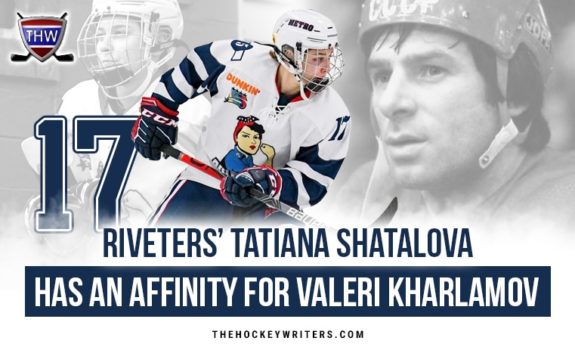
While she has represented Russia in international play at two different IIHF Women’s U18 World Championships, Shatalova was actually born in Minsk, Belarus. Once part of the Soviet Union during communist times, Belarus helped comprise “Советский Союз”, along with nations such as Russia, Ukraine, Latvia, Georgia and other Eastern Bloc countries. Soviet hockey is very much the hockey history for all of those nations collectively.
Historically, there has perhaps never been a nation more hockey-dominant on the international stage than the Soviet Union. From 1956 through 1988, the Soviet Men’s Hockey Team won an Olympic gold medal seven times. Their incredible international record from their inception in 1954 through 1991 when the Soviet Union disbanded was an astounding 738-110-65.
If not their finest player, Valeri Kharlamov was certainly the Soviets’ most exhilarating.
Kharlamov – a Soviet National Treasure
Playing for the Soviet national team from 1969 through 1980, Kharlamov won two Olympic gold medals, one Olympic silver, eight World Championship golds, two silver and one bronze. In 17 Olympic games, he scored 15 goals, 21 assists and 36 points – a pace of 2.12 points per game. Likewise, Kharlamov went 74-82-156 in scoring through 105 World Championship games.
It wasn’t just that Kharlamov generated points. He was a true pleasure to watch out on the ice anytime that he touched the puck. Catlike and elusive in his skating, he could put less skilled skaters onto their backsides with just a quick shift of his stride. Kharlamov’s acceleration and his ability to slip through gaps were simply uncanny.
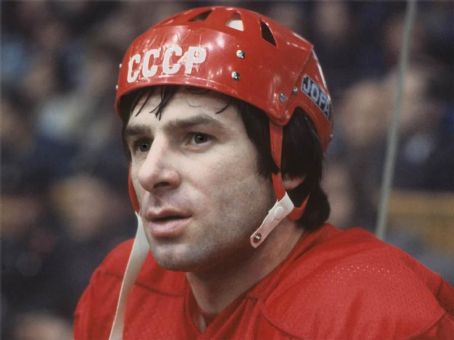
If you have never had the pleasure of seeing Kharlamov in his prime, we strongly encourage you to watch the 1972 Summit Series, featuring the best players that the Soviet Union and Canada had to offer. He stunned hockey fans throughout Canada, and showed that he was every bit as good – if not better – than the NHL players.
“He was technically very strong,” Shatalova explained. “Kharlamov had the hands of a god. He liked to make passes, but he could also generate plays alone without making a pass at all. I love the way that he played.”
Shatalova Appreciates Kharlamov’s Brilliance
Another enjoyable game where one can see Kharlamov’s brilliance is the Dec 31, 1975 New Year’s Eve game between the Soviet Red Army and the Montreal Canadiens.
In what would end up being a 3-3 tie between the two best teams in the world, Kharlamov scored the Soviet’s second of the game when he split through Hall of Famer’s Jacques Lemaire and Serge Savard, only to cleanly beat goaltender Ken Dryden to make it a 3-2 score.
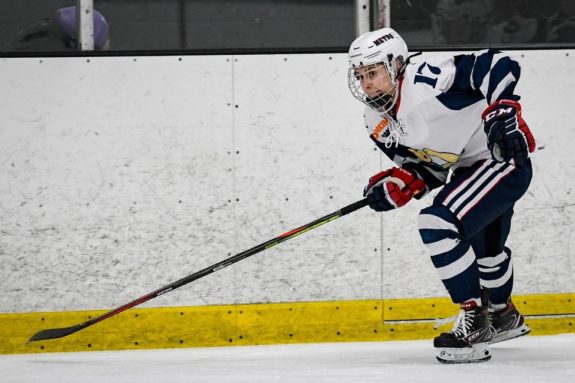
“I have watched all of these games with Canada,” said Shatalova. “I have probably watched them through at least five times.”
When asked what she would want her Riveters teammates to realize about Kharlamov and why she idolizes him, Shatalova responded:
“I would want them to know that he absolutely killed it on the ice against the best of the NHL in 1972,” she said. “Those Soviet teams were a machine. They were nicknamed the ‘Red Machine’. Then, Kharlamov did it again in 1975.”
In many ways, Kharlamov is a Soviet/Russian national treasure for hockey, and this was further validated with his induction into the Hockey Hall of Fame in 2005.
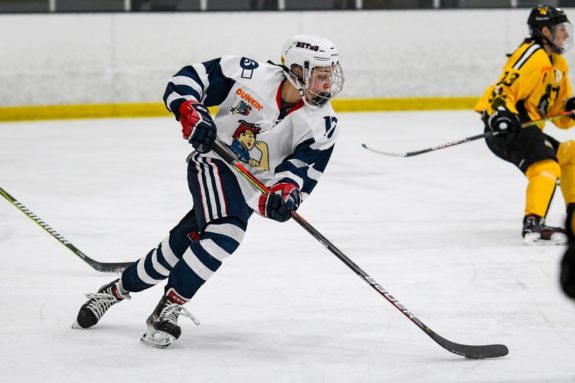
Quite sadly, Kharlamov was killed in an automobile accident on Aug. 27, 1981. He was just 33 years old at the time of his death. Almost exactly 18 years later, Shatalova was born on Aug. 17, 1999.
Shatalova’s Game Is Very Much Inspired by Kharlamov
In her very first NWHL season, Shatalova has been able to generate moments of skill which Kharlamov himself would likely be proud of. Truth be told, she would have it no other way. Shatalova does her best to replicate the same shifty stickhandling that Kharlamov was capable of. She is very slippery when she gets in behind opposing defenses.
“Probably it’s hard to see an exact resemblance between us,” she said, “but I have learned to play the game like Kharlamov did. I often like to push the puck ahead on my own and skate with it like he did. I have definitely stolen some things from him.”
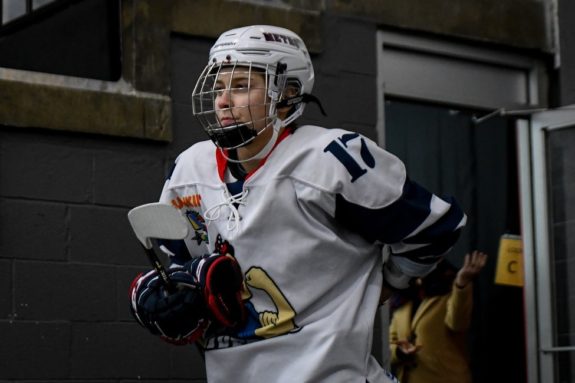
In 21 games for the Riveters in her rookie season, Shatalova is listed as 2-10-12 in scoring for her team. She did however score a third goal – a shootout game-winner against the Whitecaps in Minnesota on Dec. 14, 2019. This game-winner was the first goal of her NWHL career. Shatalova’s 74 shots through the team’s 22 games are fifth most on Metro’s roster – 59 of which have made it to the net. .
Despite having more of a lithe build – Shatalova stands 5-foot-5 and 135 pounds – she can play the physical game too. Accumulating 29 penalty minutes in those same 21 games, she has received a fighting major this season as well – a rarity for women’s hockey.
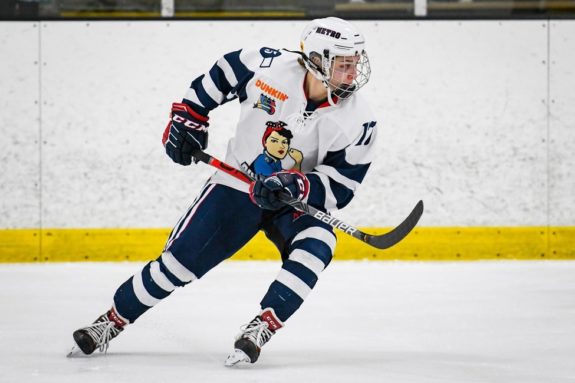
The more robust aspects of Shatalova’s game are not unlike that of her hero. Despite his immense skill set, Kharlamov never shied away from the more pugnacious parts of hockey. Oftentimes he was specifically targeted by the opposition, who out of frustration, resorted to chops (à la Bobby Clarke) and elbows (à la Ed van Impe) in order to impede or neutralize him.
More Russians in the NWHL’s Future?
Though Shatalova may be the only Russian in the NWHL this season, she is far from the first.
During the inaugural 2015-16 season, the league was blessed with Lyudmila Belyakova (Riveters), Yekaterina Smolentseva (Connecticut Whale) and Katia Pashkevich (Connecticut Whale). Russian netminder Mariya Sorokina split the 2018-19 season between the Whale and Riveters organizations.
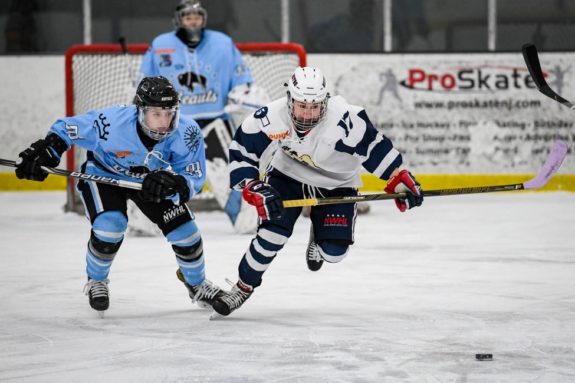
It would nice if Shatalova’s successful rookie season opened the floodgates and inspired her fellow countrywomen to cross the pond. While she acknowledges the possibility that other Russians could join the NWHL, Shatalova also feels content being the lone one for now.
“I don’t know if more will join,” she said. “It would be nice, but it doesn’t really bother me either way.”
In the meantime, NWHL fans can simply enjoy spectating over Shatalova’s own flashes of brilliance. They can also watch with the understanding now that any deke she makes, any goal she slips home, any breakaway she generates all come with a little extra meaning for her. For Shatalova, playing the game while donning number-17 is a most fitting tribute to her hero, Valeri Kharlamov.